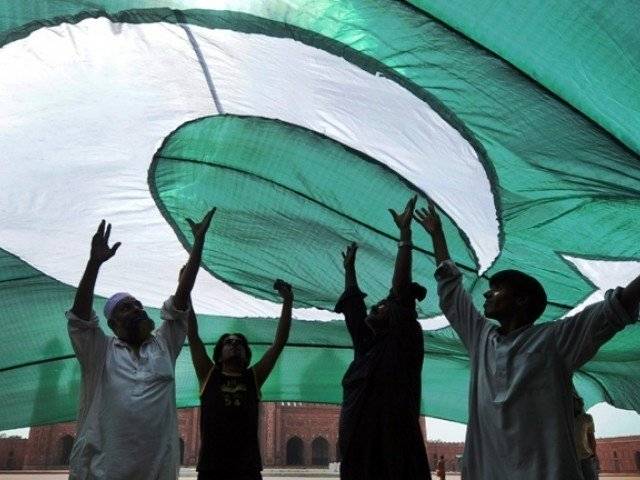
Last week, Naya Daur TV feature Khabar Say Aagay held a discussion on current challenges faced by Pakistan and how to transform Pakistan into a normal country. Raza Rumi and Murtaza Solangi were joined by former ambassador Husain Haqqani.
Reportedly, Army Chief Gen Bajwa (in his off-the-record meeting with a group of journalists a few weeks ago) mentioned how Pakistan should turn into a normal state. Raza Rumi asked Haqqani what the salient features of a normal state were.
Features of a 'Normal' State
1. There is a unitary armed force and no space for armed, militant non state actors who would challenge the writ of the state.(writ of state)
2. A political/constitutional structure with hierarchy and defined roles of key actors. (checks and balances)
3. Economic planning based on the welfare of the people.(Economy)
4. A normal state, unlike abnormal state, is not in a continuous state of war. As opposed to a security state, it stands as a welfare state.
According to Haqqani, a normal country turns into an abnormal one when economic considerations and political expediencies are ignored while making decisions and some abstract ideology becomes the guide. Secondly, there is a continued strife among key institutions, say political parties vs establishment as has been the case in Pakistan. The entanglement of military establishment in domestic politics has prevented a balance much needed in Pakistan which struggled for resources in its nascent days. However, its military as an institution was relatively overdeveloped at the time of creation – and was made even stronger owing to pacts signed by Ayub Khan transgressing civilian leadership, Haqqani added.
An oversized institution created, or say projected the enemy image according to its own height and size; though it should have been the other way round. Moreover, there were differences on account of centralization (favoured by civil-military bureaucracy) and devolution of power (favoured by smaller provinces). A so called parity principle was used for the one-Unit formula – an arrangement that disenfranchised the significant half of the country. In a way, one may ascribe Ayub's era as having elements of abnormality and this somehow played into the debacle of 1971.
Unfortunately, in 1980s Pakistan descended into chaos and sectarian violence. Haqqani believes that Pakistan will have to end violent extremism and all of its manifestations. He hopes that Gen Bajwa's notion of 'normality' would translate into such a reality.
Moreover, there is a need to be open-minded as citizens and be tolerant and embrace diversity. There is a need for a paradigm shift and making economics as a basis of policymaking rather than employing abstract notions. Being strong from within is a prerequisite to be capable enough to resolve country's disputes like Kashmir.
Last but not the least, civilian rule ought to be respected to make Pakistan normal again.
Reportedly, Army Chief Gen Bajwa (in his off-the-record meeting with a group of journalists a few weeks ago) mentioned how Pakistan should turn into a normal state. Raza Rumi asked Haqqani what the salient features of a normal state were.
Features of a 'Normal' State
1. There is a unitary armed force and no space for armed, militant non state actors who would challenge the writ of the state.(writ of state)
2. A political/constitutional structure with hierarchy and defined roles of key actors. (checks and balances)
3. Economic planning based on the welfare of the people.(Economy)
4. A normal state, unlike abnormal state, is not in a continuous state of war. As opposed to a security state, it stands as a welfare state.
According to Haqqani, a normal country turns into an abnormal one when economic considerations and political expediencies are ignored while making decisions and some abstract ideology becomes the guide. Secondly, there is a continued strife among key institutions, say political parties vs establishment as has been the case in Pakistan. The entanglement of military establishment in domestic politics has prevented a balance much needed in Pakistan which struggled for resources in its nascent days. However, its military as an institution was relatively overdeveloped at the time of creation – and was made even stronger owing to pacts signed by Ayub Khan transgressing civilian leadership, Haqqani added.
An oversized institution created, or say projected the enemy image according to its own height and size; though it should have been the other way round. Moreover, there were differences on account of centralization (favoured by civil-military bureaucracy) and devolution of power (favoured by smaller provinces). A so called parity principle was used for the one-Unit formula – an arrangement that disenfranchised the significant half of the country. In a way, one may ascribe Ayub's era as having elements of abnormality and this somehow played into the debacle of 1971.
Unfortunately, in 1980s Pakistan descended into chaos and sectarian violence. Haqqani believes that Pakistan will have to end violent extremism and all of its manifestations. He hopes that Gen Bajwa's notion of 'normality' would translate into such a reality.
Moreover, there is a need to be open-minded as citizens and be tolerant and embrace diversity. There is a need for a paradigm shift and making economics as a basis of policymaking rather than employing abstract notions. Being strong from within is a prerequisite to be capable enough to resolve country's disputes like Kashmir.
Last but not the least, civilian rule ought to be respected to make Pakistan normal again.
